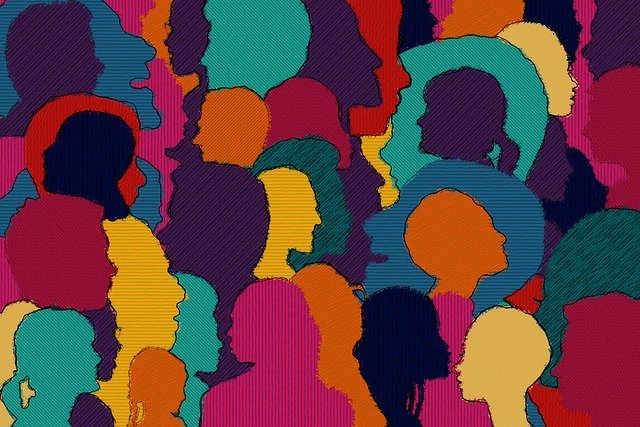Guest post by Emma Hinkle.
The field of genetics has provided some of the answers to life’s biggest questions. However, discovering the base pairs that define us has more often driven us apart instead of together. Genetics should be for all people, but this field lacks equity in three specific ways: education, research, and representation.
Education
Genetics is often used to claim that race is not a social construct. However, genetics shows instead that race is a social construct. Genetically, each person is 99.9% similar to any other human on this planet. The features that make each of us unique consist of very few genetic changes — most often those involving appearance, like hair, eye, and skin color. Where people came from (Africa, Asia, Europe, Latin America, etc.) can be a predictor of genetic likelihood of disease. However, it is incorrect to make blanket statements about the likelihood of disease for specific socially-determined races.
Many studies, including the African Genome Variation Project, demonstrate there is more genetic diversity in Africa than the rest of the globe. For example, Sickle cell disease is often called a ‘Black’ disease but is better described as prevalent in wetland areas of the Middle East, Asia, and Africa. Susceptibility for this disease is not based on race as defined by someone’s skin color, but is instead driven by where someone’s ancestors originated from geographically. DNA can be used to link someone to a specific geographical region (like how 23andme uses DNA to predict ancestry). In the case of Sickle cell disease, geographical ancestry (wetland vs desert) is more informative for a person’s disease susceptibility than that person’s skin color. Having a copy of the gene variant that causes Sickle cell disease is protective against malaria, so those who live in wetland areas in Africa, India, or Asia are more likely to have this gene variant. Thus, it is incorrect to refer to Sickle cell disease as a ‘Black’ disease since some African ancestral groups have similarly low susceptibility to non-African ancestral groups.
Race and genetics were rarely discussed together in my academic experience. In college, I majored in genetics, and I am currently pursuing a PhD in genetics and molecular biology. I was taught very little about race and genetics in my genetics classes, but instead had to seek out the information myself. If my experience is representative, then the genetics curriculum at both undergraduate and graduate levels need to change. Perhaps professors are not sufficiently trained to lecture on the topics of race and genetics. It is of the utmost importance that genetics courses include this material, and that professors are prepared to facilitate these discussions so that students are taught the scientific evidence that race is not genetic.
Research
Some of the most exciting genetic studies are genome-wide association studies (GWAS). These studies examine many people (as many as 1 million!) with the goal of trying to associate certain genetic locations with diseases. Most diseases are complex diseases, meaning that there are many genes and environmental factors that contribute to the disease. The benefit of GWAS approaches is that by sampling a population, there is enough statistical power to determine which genetic variants contribute to a complex disease. However, most GWAS are not diverse. The vast majority of GWAS have been conducted in people of white European ancestry. While this is great for predicting disease variants in people from those groups, it makes it much less likely someone of African or Asian ancestry will benefit from the same research.
GWAS are critical to determining some of the risk factors for diseases like heart disease, asthma, Parkinson disease, and many more. Thus, it is important for GWAS studies to be representative of the world’s population to benefit the health of ALL people, not just certain groups. Historically, there have been very valid reasons, like scientific misconduct and ethical injustices (Tuskegee trials, sterilization of women in Puerto Rico, lack of consent from the Havasupai tribe), for why it could be harder to recruit Black and Indigenous people of color (BIPOC) for genetic studies. There are currently efforts from the National Institutes of Health to prioritize research in diverse groups, but these efforts are not resulting in much change as measured by the GWAS Diversity Monitor. Much more effort is needed to prioritize and fund diversity in genetics research at the national level, especially because there are more obstacles (health, socioeconomic, cultural) to recruiting and retaining BIPOC individuals in these studies. Diversifying GWAS recruitment also increases the power of the dataset to find variants associated with disease. Further, it is useful to study the vast genetic diversity of Africa to determine the genetic underpinnings of complex diseases. Everyone should be represented in GWAS research and benefit from the resulting discoveries, so it is important to increase recruitment and retention of BIPOC groups in such studies.
Representation
Making genetics more equitable also involves recruiting BIPOC individuals to graduate school, postdoctoral positions, and especially faculty positions. Representation is important in science to encourage the next generation of scientists, build community, and help retain recruited individuals. It is also helpful for scientists to represent the communities they serve. Having someone who is a scientist and also part of their community can help these groups process scientific misconduct that happened in their communities. Kizzmekia Corbett, the Black scientist who led the team that developed the Moderna COVID-19 vaccine, has had a huge impact on the acceptance of the vaccine in the Black community because she is part of that community and is a scientist.
It’s also important that scientists work with BIPOC groups in a way that the groups are comfortable with, as Indigenous bioethicist Krystal Tsosie champions. Krystal Tsosie’s perspective as an Indigenous woman gives her a unique viewpoint on bioethics because of the many instances of injustices and bioethical breaches against Indigenous people. BIPOC are well aware of scientific mistreatment that has happened in their communities. Thus, their perspective, involvement, and representation in science will be critical to making the field of genetics more equitable. Not only does this foster trust and communication between scientists and these communities, but it can also hopefully heal some of the wounds inflicted by scientists in the past, especially when it comes to informed consent.
Representation in science is especially important at this time of our history. Diverse teams outperform non-diverse teams in terms of financial success, innovation, and overall smarts. Recruiting BIPOC researchers results in better science, provides more culturally-aware mentorship to students, and reduces the likelihood that the perspective of those communities will be overlooked. Inviting and welcoming diverse voices to the table will support new insight and perspectives for genetic research.
The field of genetics is exciting, fascinating, and holds a lot of promise for the future. However, there are still many steps to be taken to make the field more equitable and inclusive of all people. Students need to understand that genetics does not support the idea of biological races. Scientists and funding agencies need to prioritize equitable and culturally sensitive GWAS studies. Finally, universities need to understand the necessity for diverse perspectives at all levels of academia so that everyone can benefit from studying our fascinating genetic code.
Special thanks to Rachel Battaglia, Dr. Joshua Hall and Alexis Stutzman for helping review this piece.

About the author:
Emma Hinkle is a 4th year PhD candidate and NIH Predoctoral Fellow in the Giudice lab at the University of North Carolina Chapel Hill. In her free time, she co-hosts the Steministas Podcast where she educates the public about science in the news and the ethical implications of new science findings. She also tweets about grad school life, dabbles in blogging, and reads voraciously.













